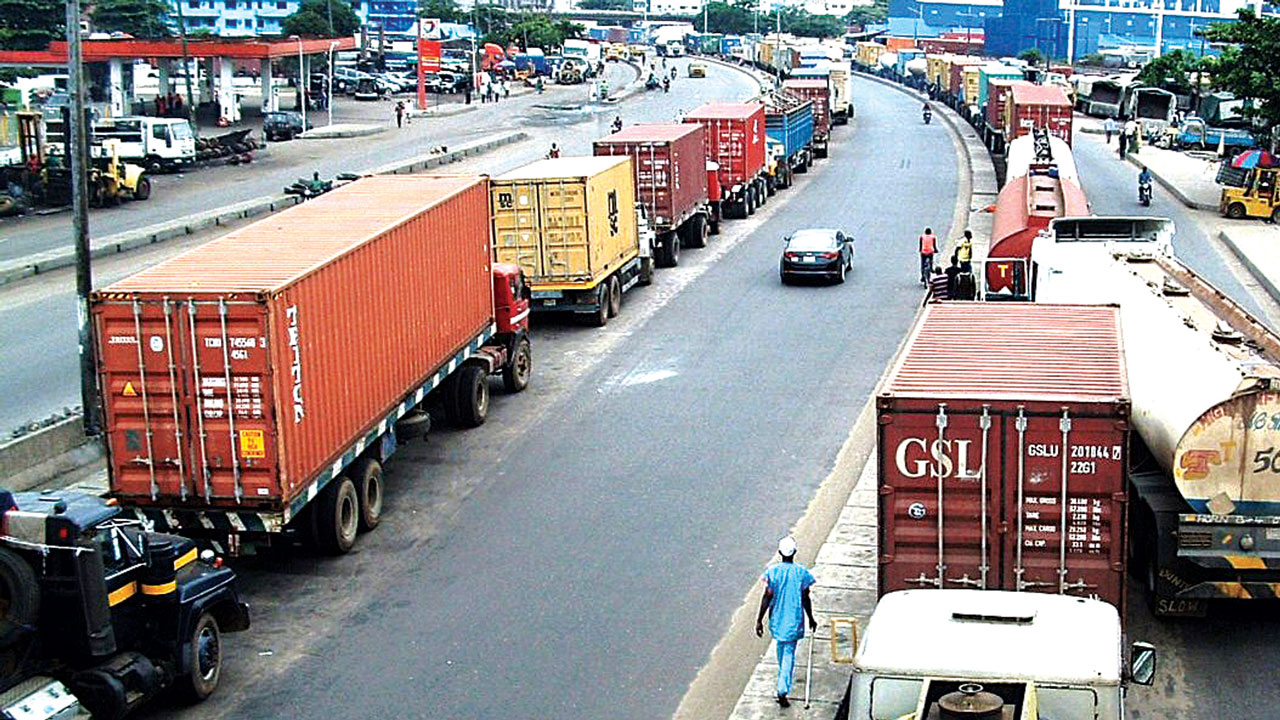
In fact, only two days after the exercise commenced, motorists could drive to the Mile 2 flyover encountering light traffic when descending the Mile 2 flyover.
Before the operation commenced, commuting on Oshodi- Apapa Expressway, one of Nigeria’s busiest highways was hellish, as articulated vehicles and tankers occupied every available lane, including service lanes, from the ports up to Cele Bus Stop and beyond.
This unfortunate development led to motorists spending as much as five hours on short trips that should not take more than 15 minutes.
Relieved road users are full of commendation that the state government was able to bring back a semblance of sanity along that route in just two days, even though the entire stretch of the road was not rid of the nuisance constituted by the articulated vehicles.
Ironically, while the Oshodi-Apapa Expressway was beginning to take shape, the chaotic scenes started being replicated at alternative routes.
For instance, from Alakija to Mile 2, on the expressway, inbound Orile, articulated vehicles have taken over one lane, where they now park.
Expectedly, this has given birth to traffic snarl on that route.
The same scenario is playing out on the Old Ojo Road, in Oriade Local Council Development Area, as tankers and trucks have taken over a lane of the road, forcing vehicles to navigate through the inner streets.
Barely four days after parts of the troubled expressway was rid of articulated vehicles, they gradually staged a comeback, and this development made climbing and descending the Mile 2 flyover a challenge as these vehicles took over its foot and mouth.
The resultant traffic build up around the flyover sometimes flowed into Alaba Express Bus Stop on the Oshodi-Apapa Expressway.
As the articulated vehicles staged a comeback after they were initially dislodged, they also took over one of the speed lanes from Sanya Bus Stop to up to Ijesha.
In addition to this, some trucks and tankers drivers started parking their vehicles on the service lane, especially between Coker and Odi-Olowu Bus Stop, and sometimes around Mile 2.
The only difference from what used to be the case was that a single, orderly lane was maintained.
Another column was also formed by these heavy-duty truck drivers on the service lane at Mile 2 inbound Oshodi, especially Fagbems to the Second Rainbow Bus Stop, which they have now turned into a parking lot.
The implication of this is that in no distant time, these articulated vehicles would return to all the places that they were expelled from, and commercial bus drivers, most of whom are very reckless would also continue driving against traffic, and the chaos that was the order of the day before the intervention would also return.
Even though they see the initiative by the state government as unsustainable, stakeholders are lauding it while maintaining that it has brought some respite to residents and motorists who ply the route.
However, they were glad when Governor, Mr. Akinwunmi Ambode, announced that the operation would be extended, and a collaboration formed with the Federal Government, in a bid to reinforce the task force.
The state Commissioner for Transport, Ladi Lawanson, while speaking after a stakeholders’ meeting at the instance of the governor, informed that a security task force, which would work continuously for 30 days in order to bring sanity to the roads has been constituted by the Federal Government and the Lagos State government.
He also informed that to cushion the harsh effect of the exercise on road users in the area, the Federal Ministry of Power, Works and Housing would immediately commence palliative measures on bad portions on access roads.
“The Department of Petroleum Resource (DPR) is also to ensure that tank farm owners comply with holding bay requirements, while trailers not called upon and found trampling will be impounded and sanctioned in Lagos.
“With immediate effect, the Lagos State government has suspended the approval of tank farms and the government is going to accelerate the completion of the Bola Ahmed Tinubu Trailer Park, and it should be ready within a month,” Lawanson said.
The state government further directed that all truck and tanker owners must be duly registered and well regulated by their unions, adding that the unions would be held accountable for failure of their members to adhere to extant rules and regulations.
“The Nigeria Ports Authority (NPA) in collaboration with the Lagos State government will, going forward license trailer parks whereby only trucks housed in those designated parks will be granted access.
Furthermore, tank farms without adequate loading bays within the next 30 days will be sanctioned.”
Recently during the visit of acting President Yemi Osinbajo to Lagos, Ambode, who spoke shortly after an on-the-spot assessment in the Ajegunle area of the state, ordered the immediate closure of Climax Bonded Terminal, Ajegunle, claiming its operation was not only illegal, but also causing untold hardship to residents of the area.
Ambode, who was saddened by the situation in the area, directed that the terminal and other adjoining areas be closed, while trucks parked around the terminal evacuated within 24 hours.
He said that the state government had no record to show that the operators of the terminal were authorised to convert the property for such purpose, warning that the government would not fold its arms and allow flagrant abuse of its building laws to the detriment and safety of residents.
Ambode added that the decision to shut down the place was in furtherance of the need to protect residents from imminent danger, which such buildings portend, saying that the primary responsibility of the government was to protect lives and property.
He said the presence of trucks on the single lane road in the Ajegunle axis was subjecting residents to long hours in traffic and also constituting environmental menace.
[ad unit=2]



